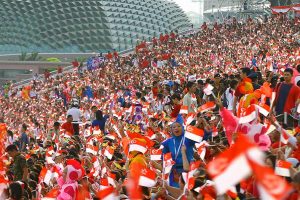Singlish, A Singaporean Creole Language
By Sarah-Claire Jordan
 Singapore is a fascinating place, simply due to the fact that is one of three surviving city-states in the world and the only island city-state. It is also famous for being a sort of meeting point for a variety of different cultures, namely Malay, Chinese, and Indian. Singapore was colonized by Britain in 1819 and remained under British rule until the outbreak of World War II, when it was occupied by Japan. All of these influences resulted in the Singapore we know today, a powerful, bustling city with a lot of economic influence.
Singapore is a fascinating place, simply due to the fact that is one of three surviving city-states in the world and the only island city-state. It is also famous for being a sort of meeting point for a variety of different cultures, namely Malay, Chinese, and Indian. Singapore was colonized by Britain in 1819 and remained under British rule until the outbreak of World War II, when it was occupied by Japan. All of these influences resulted in the Singapore we know today, a powerful, bustling city with a lot of economic influence.
There are four official languages in Singapore: English, Malay, Mandarin, and Tamil. English is the language of everything from business to schools and the government. It also acts as the lingua franca of the city-state, as most Singaporeans are bilingual and also speak Mandarin, Tamil, Malay, or a variety of other languages. There is one language, however, that the government has tried to discourage known as Singlish, or “Colloquial Singaporean English”.
Despite the name, it is not simply a dialect of English spoken in Singapore; that would be Standard Singapore English. Singlish is an English-based creole language that has developed over time from a pidgin language that was the result of British colonization. Today, Singlish is a language that the government of Singapore is trying to get rid of, even by putting on events that encourage citizens to “speak good English”.
Even with the negative position of the government, Singlish continues to be spoken and has come to be a symbol of Singaporean identity. Its lexicon is a mix of Malay, Mandarin, English, Cantonese, Tamil, Hokkien, and Teochew words, with the grammar being heavily influenced by Mandarin and Malay. It is as much a product of Singapore as any other aspect of the culture, and yet the negative attitude some people have towards it means that it can be referred to as “bad English” or “broken English” when it is neither bad nor in need of fixing.
In some cases, the media has ignored this belief and gone on to put Singlish in the spotlight even more than it was before. This happens a fair amount in comedic television and writing, and sometimes interviewees will be interviewed on television in Standard Singapore English but respond in Singlish. This has made the playing ground a bit more even in terms of how many people are for and against the criticism that Singlish receives for being “improper” or “low”.
In spite of the open discouragement, Singlish phrases and words seem to make their way into everyday conversation that is predominantly Standard Singapore English. This is done either without realizing it or purposely, as a way to show that someone is trustworthy and a true Singaporean. This seems like it goes against everything the government says about Singlish, that it shouldn’t be used as an example of Singaporean identity. It already is a key feature of Singaporean identity, and no amount of campaigning against it will be enough to make every Singaporean change their mind.
For an overview of our multilingual Desktop Publishing services, visit our Desktop Publishing and Design page
Category: Foreign Language








